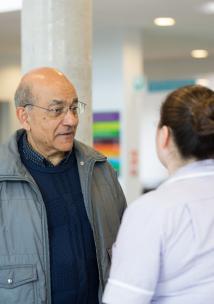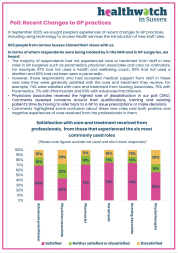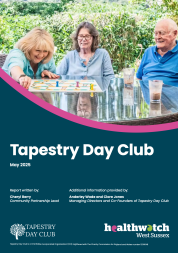Access to GP appointments across Sussex – Public Opinion

The top two reasons for this delay were ‘I tried to make one but waited too long on the phone’ (42.4%) and ‘I felt that my condition wasn’t serious enough’ (31.9%).
Around one-in-ten sought alternative support from the NHS App (9.2%), NHS111 (10.0%), Accident and Emergency (8.6%), or at an Urgent Treatment Centre or Minor Injuries Unit (5.0%).
We are concerned that people are putting off or delaying making a doctor's appointment because they cannot get through on the phone. Some people think their health condition is not serious enough but 13.6% of those people who did not see a GP went straight to A&E or an Urgent Treatment Centre.
The Healthwatch survey provides comparative results with a similar survey from June 2020, identifying some trends:
- The proportion of people delaying a GP appointment has increased 56.3% Dec' 2022, 37.4% in June 2020
- 38.6% of people had used an online GP booking system but a notable 58.8% had not.
- People with disabilities and younger people are more likely to have delayed making a GP appointment
- Booking online increases with age - 4% more likely to use an online booking system for every year increase in age
- Those reporting a health problem or disability (53.7%) has increased from the 39.2% in 2020. Those reporting a mental health condition had increased from 17.9% in 2020 (among those reporting a disability) compared to 28.7% in 2022.
Remote or face to face appointments
By far the most popular medium was a mixture of remote and face-to-face depending on condition (65.1%).
Of the alternatives, people generally preferred phone over sending photos (39.9% and 34.9% respectively), appointment by video (34.8%), and other online means (28.9%).
17.1% objected to all remote options and preferred exclusively face-to-face appointments.
GP web sites
Knowing who to contact when the surgery was closed and how to make appointments were the most heavily rated in terms of importance (78.7% and 78.1% respectively rated these as ‘very important’).
Indications of importance, perhaps less expected, were support for mental health issues (71.6% rated as ‘very important’) and concerns over data security (68.6% rated as ‘very important’).
Downloads
The Executive summary and full report are available to download

